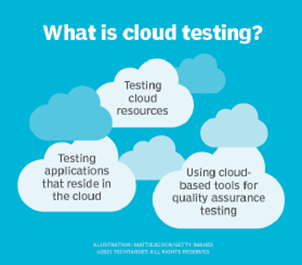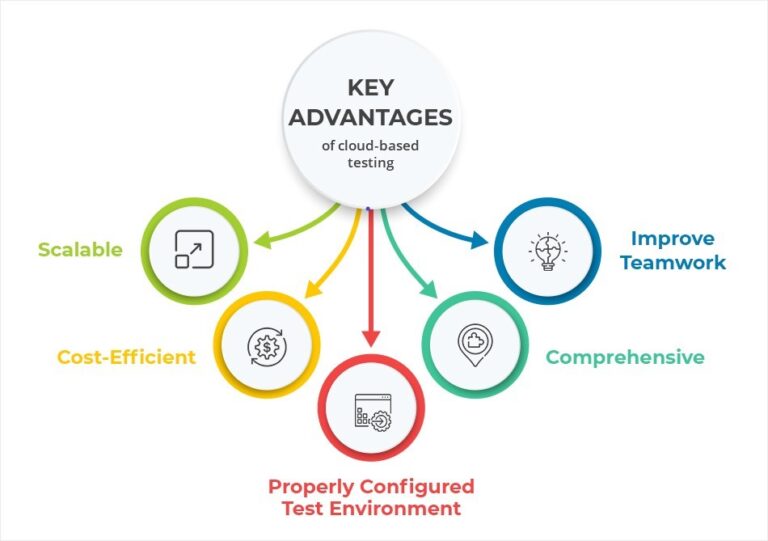What Is Cloud Testing
Cloud testing, also known as cloud-based testing, is a form of software testing that assesses the performance, security, scalability, and reliability of web applications on a QA tester’s cloud computing environment. For organizations testing cloud resources, this ensures optimal performance, availability and security of data, and minimizes downtime of the associated infrastructure/platform.

Cloud testing enables easy and quick provisioning of testing environments, eliminating the need of shared test environments. Compared to traditional methods of testing, cloud testing reduces delivery times, improves flexibility, and offers pay-per-use costs. Technologies and test processes used to conduct functional tests for cloud-based applications are not that different from traditional on-premises applications. However, third-party testers know about the non-functional risks associated with cloud systems, and it is a critical success factor.
Business Impact
“The cloud testing market is expected to register a CAGR of over 13% over the forecast period (2021 – 2026). The demand for cloud testing is increasing owing to the capabilities of cloud sourcing technology in software testing activities to perform quality assurance (QA) and to remove bugs.” – Mordor Intelligence
According to Emergen Research, the global cloud testing market size is expected to reach USD 21.67 Billion in 2028 and register a robust revenue CAGR of 12.8% throughout the forecast period.
Technological advancements such as edge computing, 5G, real time analytics using ML and AI, and preference for on-demand services will drive revenue growth. With the adoption of DevOps, the cloud testing market is achieving rapid growth.
Enterprises adopting cloud-based testing can benefit in the following aspects.

- Cost efficiency: There is zero investment and no additional maintenance costs for the application. The pay-per-use model and on-demand availability of cloud-based testing tools eliminates the investment costs of purchasing, maintaining, and upgrading the software/hardware.
- Scalability: Cloud testing offers flexibility to enterprises. Testers can increase/decrease computing resources fast, thus addressing the dynamic needs of the customers quickly.
- Test environment: It takes time to set up an ideal test environment on all the devices. Moreover, configuration errors can repeat on all devices. Cloud-based tools are preconfigured by the service providers that saves time and money. To achieve best results, enterprises can use customized tools by combining multiple test environments.
- Increases efficiency: Cloud testing reduces the time to set up a test environment from weeks to minutes and lowers the quality risks.
Types of Cloud Testing
While the term cloud testing broadly refers to testing applications through cloud computing resources, the main types of cloud testing:
Functional Testing
It verifies and validates the functionalities of a software application.
- System Testing — Evaluate requirements & functionalities for end-to-end application development
- Acceptance Testing — This technique ensures that the software is ready to use.
Non-functional Testing
It ensures delivery of non-functional aspects like performance, usability, reliability, and response time.
- Security Testing- This type of testing checks for six major principles – Authorization, Availability, Authentication, Confidentiality, Integrity, and Non-repudiation.
- Scalability and Performance Testing – It helps understanding the system behavior for a certain expected load.
- Compatibility Testing- It checks for compatibility with various cloud environments and instances of different OS.
- Disaster Recovery Testing- It evaluates the response time and ensures that the application is recovered quickly with minimum loss of data.
- Multi-Tenancy Testing – In this type of testing, a single instance runs on the primary server and multiple tenants. The test environment aims at allocating a fixed share of the instance to every tenant including individual functionality, data, user management, configuration, and other non-functional properties.
Few Popularly Used Cloud Testing Tools

Akamai CloudTest
A cloud-performance testing platform that provides automated and intelligent real-time testing on cloud infrastructures. It may be a good tool for DevOps teams looking to use a test engine that can mimic real-life performance scenarios. It can easily pick and record issues within your applications quickly, regardless of the test load.
AppPerfect
This cloud testing tool is used by QA teams for automated testing on web applications. Its features ensure quality compliance in cloud infrastructures. Also, this tool supports testing across multiple frameworks and operating systems.
CloudQA
DevOps teams needing a codeless testing method use this tool for creating test cases based on logical grouping. Additionally, it offers quick options for site monitoring and load testing any extensive set up for a test environment.
Nessus
For comprehensive security testing, developers use this tool. Key features include network discovery, compliance checking and server hardening. This tool can scan your cloud-based apps and web apps for vulnerabilities and reduce the risks of a data breach.
Wireshark
An open-source cloud-based testing tool, its features help network administrators automate testing of data shared across the network. The tool runs easily on multiple OS like Linux, Windows, and macOS. It exports data in multiple formats of PostScript, XML, CVS, etc. and provides a real-time view of data transmission.
BrowserStack
It has zero setup and maintenance cost facilitating faster time-to-market for web and cloud-based apps. The test environment covers real-world examples to deliver accurate results.
AWS Device Farm
This platform allows testing mobile and web apps across multiple devices, OS, and frameworks. This tool generates test reports and analytics through logs, screenshots and videos. Using this pay-as-you-go tool, testing teams can determine test parameters for which they will be charged accordingly.
Conclusion
For every organization, innovation and resilience is the only thing that keeps them motivated to keep going amidst a global pandemic.
To showcase resilience against the unprecedented economic crisis and health, there is an increase in cloud adoption which is expected to support the acceleration. With the rapidly-evolving customer demands, cloud technologies play an important role in providing business resilience. It enables enterprises to be agile and scale at demand.
Leveraging the advantages offered by cloud infrastructure has become essential to expedite the time to market of web applications. Ensuring business agility and flexibility is key for climbing up the ladder in the digital world. Cloud-based testing helps organizations achieve this goal by introducing processes that support better workflows, fast delivery, and quicker turnaround time.
Here, at AppsTek, we deliver Digital assurance and advancement with the help of testing solutions. We work towards fulfilling the multi-faceted testing needs of digital transformation. Our cloud-based testing services not only address your digital requirements but also ensure efficient results and delivery.
Kishore Anne is the Senior Manager – Quality Engineering at AppsTek Corp. He is responsible for managing the COE team, developing, and implementing Quality Assurance, Control Methodologies using best practices to ensure compliance with QA standards in both manual and automation.






































